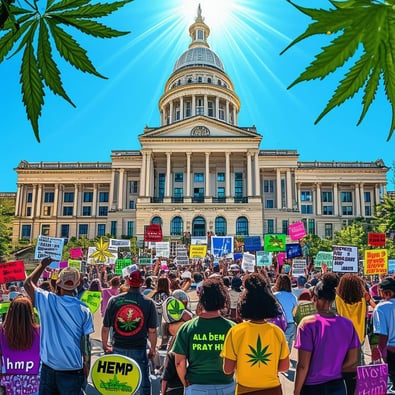Hemp-Derived Products Like Delta-8 THC Face Regulatory Scrutiny as Market Grows.
As the cannabis and hemp industries continue to expand, the regulation of hemp-derived products, such as Delta-8 THC, has become a focal point of debate. Pablo Zuanic, a highly-respected equity analyst following the cannabis and psychedelics industries and an upcoming speaker at the Benzinga Cannabis Capital conference, addressed the future of hemp derivatives during a recent interview.
With evolving state regulations and increasing market share, Zuanic said that these products are becoming a permanent part of the industry.
Hemp's Growing Role in the Market
Hemp-derived products have rapidly gained popularity, leading to a highly fragmented market with various players across the supply chain. Zuanic explained the widespread presence of hemp derivatives in the U.S. market. "Hemp derivatives are here to stay," he said. He described the hemp industry as "a very democratic industry, a very competitive capitalist industry" due to its diverse components, including farmers, processors, and manufacturers.
Although hemp-derived products like Delta-8 THC were not originally intended to become such a large part of the market under the 2018 Farm Bill, Zuanic noted that these products have taken on a significant role. "It's not a small little loophole. It's a big thing. It's a big industry," he said, emphasizing the unexpected growth of the hemp derivatives market.
Regulation Is on the Horizon
While hemp-derived products continue to thrive, Zuanic highlighted the growing need for regulatory oversight. He pointed to the current patchwork of state regulations, with some states attempting to enforce stricter controls on producing and selling hemp products. For instance, Florida's governor vetoed a ban on hemp derivatives, but the state still enforces regulations around testing and packaging.
Zuanic said that the disparity in regulations between the hemp and cannabis industries has created an uneven playing field. "It's not a level playing field with the cannabis industry," he said, pointing out how cannabis businesses face much stricter federal and state regulations.
Zuanic believes that as regulation evolves, both industries will be able to coexist in a more regulated environment. Over the next four years, regulations will probably be established to allow both industries to coexist, he added.
A Long-Term Outlook
As the market for hemp-derived products matures, it is clear that these products will continue to play a major role in the cannabis space. Zuanic's insights offer a realistic view of the industry's future, where hemp derivatives are more tightly regulated but remain an important market segment.
With Zuanic set to speak at the upcoming Benzinga Cannabis Capital Conference in Chicago on October 8-9, his thoughts on hemp and cannabis regulation will likely inform discussions among industry leaders about how the two markets can evolve together.
Cannabis rescheduling seems to be right around the corner. Want to understand what this means for the future of the industry? Hear directly from top executives, investors, advocates, and policymakers at the 19th Benzinga Cannabis Capital Conference in Chicago this Oct. 8-9. Get your tickets now before prices surge by following this link.
For more Cannabis News like this, circle back to 420intel.com!
420 Intel News | 420 Advertising | Cannabis Business News | Medical Marijuana News | Recreational Marijuana News





